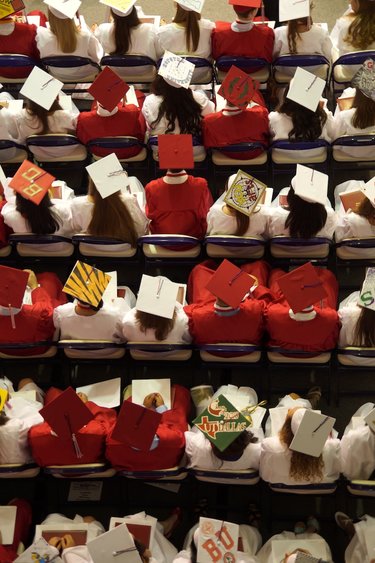Local school districts examine Regents' rules
Local school leaders are in the throes of figuring out how to put new graduation options into place for current high school seniors. They see both advantages and drawbacks to the plan adopted this month by the state’s Board of Regents, which governs education in New York.
In announcing the plan, the Regents chancellor, Merryl Tisch, said the goals are to improve graduation rates — currently at 75 percent statewide — and to increase the percentage of students who graduate ready for college and careers, which the board puts at 37 percent.
“We’re trying to figure it out right now,” said Voorheesville Superintendent Theresa Thayer Snyder on Monday. “We expect it will be a good thing.”
Currently, students across the state must pass five Regents exams in order to graduate: one each in English, math, and science as well as the exams in two social studies courses — United States history and government, and global studies and geography. The new graduation regulations allow what is called the 4+1 option: Students choosing that path will still have to pass Regent exams in English, math, and science but will take just one social studies exam and replace the other with a fifth rigorous Regents exam on a subject chosen by high school students, themselves.
Students may focus on a Regents course in arts, languages other than English, humanities, Career and Technical Education (CTE); and Science, Technology, Engineering, and Mathematics (STEM). A video of the new pathways programs can be seen at www.p12.nysed.gov/cte.
According to the Regents board, the 4 + 1 option will motivate students to stay in school, thereby improving the graduation rate and providing skills needed to enter the workplace after high school graduation. The Regents quoted statistics from the United States Bureau of Labor Statistics that, by 2018, nearly half of all jobs created will require an associate’s degree or an occupational certificate yet, if current trends continue, the board maintains,, citing a report from America’s Edge, New York will face a shortage of 350,000 workers for those skilled jobs by 2020.
The Regents’ changes will create a two-year course requirement for global history and geography, and require all students entering ninth grade from September 2016 on to earn four years of credits in social studies.
Also, under the new plan, a CTE course that meets approved requirements for science can be substituted for the required science Regents exam.
The 4+1 option will apply to students eligible to graduate this year.
At Voorheesville
The program “has the capacity to be a real change,” said Snyder who met with other school-district leaders this week to discuss the options. “New York doesn’t have the ability to roll things out smoothly. What’s on the table now is a good thing…I don't see how that’s going to happen in any school district as the year is underway.”
Snyder said that the plan would be put in place as soon as possible.
“Implementation is the critical piece,” she said. “We’re still receiving guidance.”
Voorheesville will be able to offer pathway options in the arts as “something we have expertise in. We’ll be looking at that,” Snyder said. “The arts, for sure.”
The district may be able to offer an alternative science Regents exam, she said, and also a technology option.
“The CTE part is going to be tough. We don't have personnel or equipment,” Snyder said. “We have options through BOCES.”
Voorheesville will work with the Board of Cooperative Educational Services as it learns what will be accepted as an alternative rigorous course and exam. For other courses, Snyder said, the district would partner with nearby schools.
Snyder said that offering program choices that are interesting to students is a good idea, but that the district is still in a “holding pattern” while it waits for the Board of Regents to guide schools on how to provide those choices.
“When we do it, we want it to be very well done,” she said.
At Guilderland
Guilderland’s assistant superintendent for instruction, Demian Singleton, said he has “mixed feelings” about the new graduation options. “There’s a lot of merit to a career pathways graduation approach,” he said. “It’s a very reasonable potential solution to some students’ struggle to graduate.” Singleton cited a recent Harvard study that showed students are more likely to graduate if they have “ownership of the track and pathway they follow.”
However, he went on about the downside of the new requirements, “I have a longer-term concern that social studies is being pushed to the back burner.” He noted that the state has eliminated the fifth-grade and eighth-grade exams in social studies and now is reducing one at the high school level. Singleton spoke about the central role that social studies should play in an educational program.
He also said there are problems in applying the new options instantly for this year’s graduates. “It creates a little fury and craziness for end-of-year exams,” he said. For example, it is not clear yet what comparable exams will be accepted by the state for students who choose the arts pathway since there are no Regents exams in that field.
Singleton said he has no way of knowing at this point how many Guilderland students will choose one of the new options for graduation. Guidance counselors will be working with the students to determine their goals, he said.
At BKW
With just a week since the changes were approved, Berne-Knox-Westerlo’s Interim Superintendent Joseph Natale said it’s too early to tell how it will affect his district.
“I think it’s a good thing. We haven’t really had a chance to really assess how it affects us in terms of any cost or opportunity,” said Natale. “We have kids in the CTech program over in BOCES. I don’t think it’s a major leap.”
He said he couldn’t yet assess student demand for the new options, noting the development of alternative exams hasn’t yet begun.
“I just think it provides more opportunities for kids,” said Natale. “I don’t think it’ll effect negativley or postively graduation rates.”
— Melissa Hale-Spencer wrote the section on Guilderland and Marcello Iaia contributed the section on BKW.



